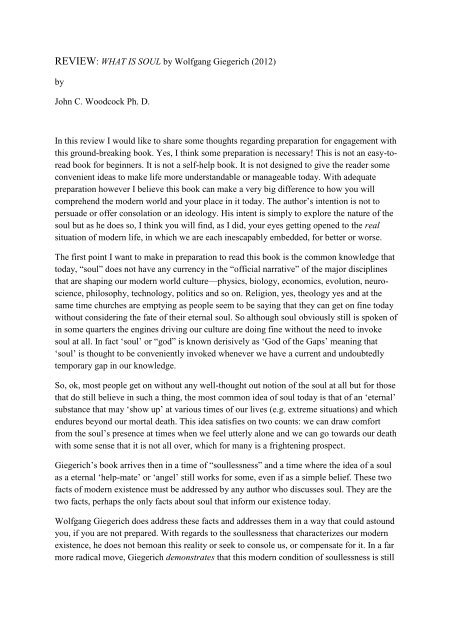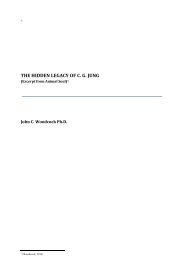WHAT IS SOUL by Wolfgang Giegerich - Lighthouse Downunder
WHAT IS SOUL by Wolfgang Giegerich - Lighthouse Downunder
WHAT IS SOUL by Wolfgang Giegerich - Lighthouse Downunder
You also want an ePaper? Increase the reach of your titles
YUMPU automatically turns print PDFs into web optimized ePapers that Google loves.
REVIEW: <strong>WHAT</strong> <strong>IS</strong> <strong>SOUL</strong> <strong>by</strong> <strong>Wolfgang</strong> <strong>Giegerich</strong> (2012)<br />
<strong>by</strong><br />
John C. Woodcock Ph. D.<br />
In this review I would like to share some thoughts regarding preparation for engagement with<br />
this ground-breaking book. Yes, I think some preparation is necessary! This is not an easy-toread<br />
book for beginners. It is not a self-help book. It is not designed to give the reader some<br />
convenient ideas to make life more understandable or manageable today. With adequate<br />
preparation however I believe this book can make a very big difference to how you will<br />
comprehend the modern world and your place in it today. The author’s intention is not to<br />
persuade or offer consolation or an ideology. His intent is simply to explore the nature of the<br />
soul but as he does so, I think you will find, as I did, your eyes getting opened to the real<br />
situation of modern life, in which we are each inescapably embedded, for better or worse.<br />
The first point I want to make in preparation to read this book is the common knowledge that<br />
today, “soul” does not have any currency in the “official narrative” of the major disciplines<br />
that are shaping our modern world culture—physics, biology, economics, evolution, neuroscience,<br />
philosophy, technology, politics and so on. Religion, yes, theology yes and at the<br />
same time churches are emptying as people seem to be saying that they can get on fine today<br />
without considering the fate of their eternal soul. So although soul obviously still is spoken of<br />
in some quarters the engines driving our culture are doing fine without the need to invoke<br />
soul at all. In fact ‘soul’ or “god” is known derisively as ‘God of the Gaps’ meaning that<br />
‘soul’ is thought to be conveniently invoked whenever we have a current and undoubtedly<br />
temporary gap in our knowledge.<br />
So, ok, most people get on without any well-thought out notion of the soul at all but for those<br />
that do still believe in such a thing, the most common idea of soul today is that of an ‘eternal’<br />
substance that may ‘show up’ at various times of our lives (e.g. extreme situations) and which<br />
endures beyond our mortal death. This idea satisfies on two counts: we can draw comfort<br />
from the soul’s presence at times when we feel utterly alone and we can go towards our death<br />
with some sense that it is not all over, which for many is a frightening prospect.<br />
<strong>Giegerich</strong>’s book arrives then in a time of “soullessness” and a time where the idea of a soul<br />
as a eternal ‘help-mate’ or ‘angel’ still works for some, even if as a simple belief. These two<br />
facts of modern existence must be addressed <strong>by</strong> any author who discusses soul. They are the<br />
two facts, perhaps the only facts about soul that inform our existence today.<br />
<strong>Wolfgang</strong> <strong>Giegerich</strong> does address these facts and addresses them in a way that could astound<br />
you, if you are not prepared. With regards to the soullessness that characterizes our modern<br />
existence, he does not bemoan this reality or seek to console us, or compensate for it. In a far<br />
more radical move, <strong>Giegerich</strong> demonstrates that this modern condition of soullessness is still
soul! This means that even though we feel ourselves to be in a world without soul, in reality<br />
we are still within soul, that this modern reality is the work of soul.<br />
This brings me to the second point of the ‘eternal soul’. <strong>Giegerich</strong> demonstrates that this<br />
concept of soul was indeed true, i.e. at another time (the time of metaphysical philosophy) but<br />
is no longer true for us. Two issues emerge from these astounding responses to the “facts of<br />
life” today: how can a concept of soul be true in one age and not another and what is the true<br />
concept of soul today? Both issues are raised and answered in this remarkable book. All I can<br />
do here is to give a brief summary of <strong>Giegerich</strong>’s brilliant and to my mind conclusive<br />
arguments.<br />
<strong>Giegerich</strong> throughout his book includes a scholarly review of the concept of soul from former<br />
ages, leading to the present. This may seem quite ordinary, quite in keeping with other forms<br />
of historical research where ideas about things (e.g. planets and their motion) and the way<br />
these ideas change are reviewed. But what <strong>Giegerich</strong> is implicitly proposing throughout his<br />
review is much more radical and I believe that readers must grasp what he is saying here in<br />
order even to make sense of his arguments and conclusions. So let’s unpack it a bit here.<br />
Historical research is most commonly rooted in an assumption that history is a study of ideas<br />
about the world. Our ideas get refined but the world stays the same as it always was. We just<br />
get better at matching our concepts to the reality of the given world.<br />
In order to come to terms with this book, you must throw out this assumption!<br />
The soul is not an object of historical research the same way as other things in the world.<br />
<strong>Giegerich</strong>’s starting point (his a priori) is that the soul is not a thing at all, it is what<br />
determines both our ideas and the world. From this startling a priori comes the corollary that<br />
when the soul changes or transforms, both our ideas (our philosophies) and the world i.e. the<br />
form of the world and our mode-of-existence in it transform. Not how does the soul change<br />
down through history but how does the soul change as reflected in historical movement—a<br />
totally different and radical view of history—soul as history, soul as historical movement<br />
itself, soul as determinative of our existence in the world, soul not as abstract concept<br />
conforming with some object in the world, but soul as living concept, just as Life is a living<br />
concept, not conforming to any one thing in the world but playing through and determining<br />
the life of each living thing.<br />
So we can see here that <strong>Giegerich</strong> also answers the question of the ‘eternal’ soul. Yes that<br />
idea was historically true, i.e. the truth belonging to a period of history. He demonstrates that<br />
the soul has once again transformed taking us and the world with it. The reason that we all<br />
feel the stunning absence of soul in the world today is that the living concept soul has<br />
transformed once again (roughly from the 19 th century on), only this time it no longer reflects<br />
its life in any aspect of the substantial world as it once did (e.g. Medieval Philosophy<br />
regarded nature as text which could be read in order to discover truths of the soul etc.).<br />
Instead the soul has now entered and become the very form of consciousness that we are<br />
today—a radically new situation.
We have become in our depths, what we vainly seek in the world. The present “soulless”<br />
world is still ensouled because our present world and the form of consciousness that<br />
correlates with it are both products of the soul’s latest transformation out of metaphysics and<br />
into positive-factuality.<br />
To get anywhere near <strong>Giegerich</strong>’s arguments I therefore believe the reader must throw<br />
overboard the universally accepted conception of history as a study over time of our human<br />
ideas about an unchanging world and also the reader must relativise the notion of an ‘eternal<br />
soul’ to its appropriate historical context. If you can achieve these two acts of ‘kenosis’, then<br />
I think you will find that What is Soul will indeed open up for you and become a living text<br />
that will inform you of the soul’s truths, those of the past and those of today’s modern<br />
existence.



